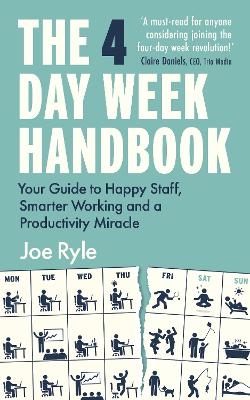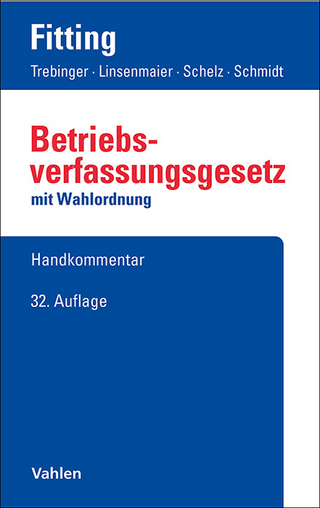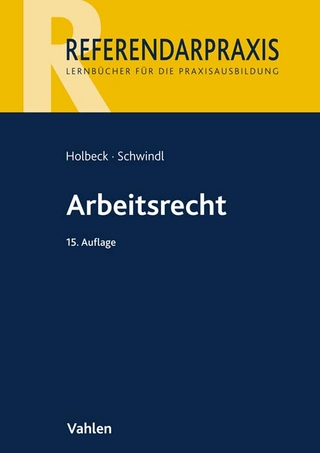
The 4 Day Week Handbook
Your Guide to Happy Staff, Smarter Working and a Productivity Miracle
Seiten
2024
Canbury Press (Verlag)
978-1-914487-19-4 (ISBN)
Canbury Press (Verlag)
978-1-914487-19-4 (ISBN)
A practical handbook that shows how companies, charities, and other organisations can improve productivity and staff loyalty by introducing a four-day week. Packed with real-life case studies and resources.
'The best guide to increasing your, and most other adults’, leisure time by 50%. With no serious downside' Professor Danny Dorling, University of Oxford
Rising numbers of employers worldwide are switching to a four-day week, making workers happier and organisations stronger.
Written by the director of the UK's 4 Day Week campaign, this easy-to-follow guide shows how businesses, charities, and councils can reap the benefits of introducing smarter working.
It takes anyone considering modernising their hours through the current academic evidence for the benefits of introducing a four-day week – with no loss of pay. It then explains the various steps you should take to adopt this human resources hack.
It tackles:
The productivity improvements that flow from more energised and focused staff
The typical challenges faced in running a trial, including part-time workers and bank holidays
The different approaches to introducing a four-day week, such as staggered and fifth-day stoppage
The 4 Day Week Handbook features case studies from the British economy, with breakouts on individual organisations. There are tips for improving the output of a business and a resources section with the essential information you need to start making progress, including a list of academics and researchers who may be able to help.
As the leader of the 4 Day Week Campaign in the UK, Joe Ryle has years of practical experience working with organisations that have adopted more flexible working.
Explaining why companies are changing, he recaps the changes to our working lives over time. At the turn of the 20th Century, workers routinely toiled for six days a week – until the Ford Motor Company invented the five-day working week, and the 'weekend'.
Now, with longer commutes and more family members employed, the five-day working week no longer works for employers or employees. Stressed-out workers stagger home on a Friday evening and take the weekend to recover, while productivity stagnates.
The 4 Day Week Handbook tracks the strong evidence that shortening working hours provides major benefits for the health and welfare of staff – and for employers. During a trial involving 2,900 workers at 61 organisations in the UK, sick days fell by 65% (improving productivity) and staff felt much more loyal to their bosses.
Companies’ revenue stayed broadly the same, rising by 1.4% on average.
The vast majority of employers who piloted a four-day week continued operating one after the trial ended.
The 4 Day Week Handbook charts the many benefits of working smarter, not harder.
Better work-life balance
A four-day week with no loss of pay gives workers the time to live happier and more fulfilled lives, allowing for those non-work parts of life that are often neglected:
rest – sleep and physical, mental, social, emotional and sensory rest
parenting –reducing the use of paid childcare
leisure – spending time with family and friends and pursuing hobbies and passions
'Life Admin' – shopping, cleaning, managing household finances
A four-day week with no loss of pay lowers the financial and environmental costs of commuting.
Higher performance and profits
Real-world examples show that employers who move to a four-day week improve productivity and cut costs. In 2021, the Henley Business School estimated that UK businesses would save a combined £104 billion a year if all the UK worked a four-day week.
Reducing the working week enables organisations to attract and retain high-quality employees who are happier and less stressed.
More sustainable lifestyle
More free time allows citizens to cycle and walk instead of driving and cook with fresh ingredients rather than buying energy-intensive ready meals.
Research has shown that a four-day week could reduce the UK's carbon footprint by 127 million tonnes per year. That is the equivalent of taking Britain’s entire private car fleet of 27 million cars off the road.
The business and human resources case for introducing a 4-day week at your office, shop or factory is clear. This succinct and practical book shows how to make the change.
Reviews
'The four-day week is an idea whose time has come. This is an invaluable guide to its benefits but more importantly how to introduce it successfully. It’s a handbook to the future of work.' John McDonnell MP, former Shadow Chancellor
'Simple, effective, efficient. The best guide to increasing your, and most other adults’, leisure time by 50%. With no serious downside' Professor Danny Dorling, University of Oxford
'A must-read for anyone considering joining the four-day week revolution!' Claire Daniels, CEO of Trio Media
'A four-day working week is long overdue and this book provides a crucial roadmap. One day, we will look back in horror at the fact we worked until we dropped.' Owen Jones, Journalist
'The best guide to increasing your, and most other adults’, leisure time by 50%. With no serious downside' Professor Danny Dorling, University of Oxford
Rising numbers of employers worldwide are switching to a four-day week, making workers happier and organisations stronger.
Written by the director of the UK's 4 Day Week campaign, this easy-to-follow guide shows how businesses, charities, and councils can reap the benefits of introducing smarter working.
It takes anyone considering modernising their hours through the current academic evidence for the benefits of introducing a four-day week – with no loss of pay. It then explains the various steps you should take to adopt this human resources hack.
It tackles:
The productivity improvements that flow from more energised and focused staff
The typical challenges faced in running a trial, including part-time workers and bank holidays
The different approaches to introducing a four-day week, such as staggered and fifth-day stoppage
The 4 Day Week Handbook features case studies from the British economy, with breakouts on individual organisations. There are tips for improving the output of a business and a resources section with the essential information you need to start making progress, including a list of academics and researchers who may be able to help.
As the leader of the 4 Day Week Campaign in the UK, Joe Ryle has years of practical experience working with organisations that have adopted more flexible working.
Explaining why companies are changing, he recaps the changes to our working lives over time. At the turn of the 20th Century, workers routinely toiled for six days a week – until the Ford Motor Company invented the five-day working week, and the 'weekend'.
Now, with longer commutes and more family members employed, the five-day working week no longer works for employers or employees. Stressed-out workers stagger home on a Friday evening and take the weekend to recover, while productivity stagnates.
The 4 Day Week Handbook tracks the strong evidence that shortening working hours provides major benefits for the health and welfare of staff – and for employers. During a trial involving 2,900 workers at 61 organisations in the UK, sick days fell by 65% (improving productivity) and staff felt much more loyal to their bosses.
Companies’ revenue stayed broadly the same, rising by 1.4% on average.
The vast majority of employers who piloted a four-day week continued operating one after the trial ended.
The 4 Day Week Handbook charts the many benefits of working smarter, not harder.
Better work-life balance
A four-day week with no loss of pay gives workers the time to live happier and more fulfilled lives, allowing for those non-work parts of life that are often neglected:
rest – sleep and physical, mental, social, emotional and sensory rest
parenting –reducing the use of paid childcare
leisure – spending time with family and friends and pursuing hobbies and passions
'Life Admin' – shopping, cleaning, managing household finances
A four-day week with no loss of pay lowers the financial and environmental costs of commuting.
Higher performance and profits
Real-world examples show that employers who move to a four-day week improve productivity and cut costs. In 2021, the Henley Business School estimated that UK businesses would save a combined £104 billion a year if all the UK worked a four-day week.
Reducing the working week enables organisations to attract and retain high-quality employees who are happier and less stressed.
More sustainable lifestyle
More free time allows citizens to cycle and walk instead of driving and cook with fresh ingredients rather than buying energy-intensive ready meals.
Research has shown that a four-day week could reduce the UK's carbon footprint by 127 million tonnes per year. That is the equivalent of taking Britain’s entire private car fleet of 27 million cars off the road.
The business and human resources case for introducing a 4-day week at your office, shop or factory is clear. This succinct and practical book shows how to make the change.
Reviews
'The four-day week is an idea whose time has come. This is an invaluable guide to its benefits but more importantly how to introduce it successfully. It’s a handbook to the future of work.' John McDonnell MP, former Shadow Chancellor
'Simple, effective, efficient. The best guide to increasing your, and most other adults’, leisure time by 50%. With no serious downside' Professor Danny Dorling, University of Oxford
'A must-read for anyone considering joining the four-day week revolution!' Claire Daniels, CEO of Trio Media
'A four-day working week is long overdue and this book provides a crucial roadmap. One day, we will look back in horror at the fact we worked until we dropped.' Owen Jones, Journalist
Joe Ryle is Director of Britain's 4 Day Week Campaign. He is Media and Comms Lead for the think tank Autonomy, a former adviser to Shadow Chancellor John McDonnell MP and a former Labour Party Press Officer.
Introduction: What is the Four-Day Week and Where Does it Come From? 7
2. The Evidence It Works 27
3. Different Approaches and Models to Implementation 41
4. Typical Challenges 59
5. Preparing For a Trial 77
6. Improving Business Performance: Working Smarter, Not Harder 89
7. Running a Trial and Measuring Success 107
8. Organising For a Four-Day Week in the Workplace 117
9. The Future 123
Acknowledgements 129
Resources, 131
Academics and Researchers Who May Be Able to Help, 131
Index, 139
| Erscheinungsdatum | 20.02.2024 |
|---|---|
| Sprache | englisch |
| Maße | 135 x 216 mm |
| Themenwelt | Recht / Steuern ► Arbeits- / Sozialrecht ► Arbeitsrecht |
| Recht / Steuern ► EU / Internationales Recht | |
| Wirtschaft ► Betriebswirtschaft / Management ► Unternehmensführung / Management | |
| ISBN-10 | 1-914487-19-2 / 1914487192 |
| ISBN-13 | 978-1-914487-19-4 / 9781914487194 |
| Zustand | Neuware |
| Informationen gemäß Produktsicherheitsverordnung (GPSR) | |
| Haben Sie eine Frage zum Produkt? |
Mehr entdecken
aus dem Bereich
aus dem Bereich
mit Wahlordnung | Handkommentar
Buch | Hardcover (2024)
Franz Vahlen (Verlag)
95,00 €
mit den wichtigsten Bestimmungen zum Arbeitsverhältnis, …
Buch | Softcover (2024)
dtv Verlagsgesellschaft
13,90 €


